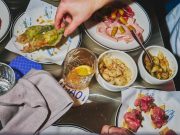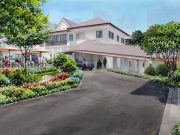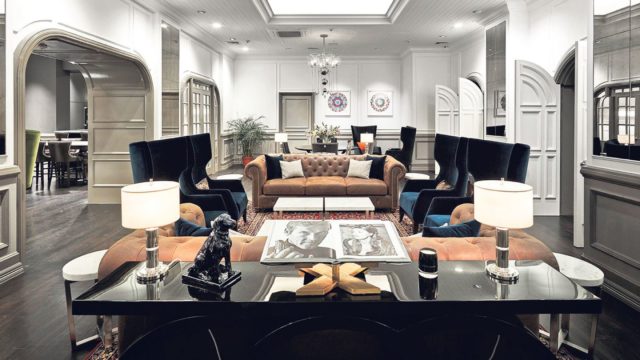Singapore, 8 Jan 2018 – Are you searching for the RIGHT ONE to purchase in 2018? In this inclusive era, would you like something that you can share with others of your ilk – sipping on a negroni and chatting about life, the universe and the next big deal?
Enter the new-age members-only club – an evolved version of the country club without the golf courses and screaming entitled kids scrambling out of the swimming pool. Think cool, contemporary spaces, created by the designer elite like Timothy Oulton or Takenouchi Webb. Think TED talks, intellectual discourse. Perhaps some gourmet cuisine thrown in.
IDEAS COMMUNITY
A handful of clubs that have opened along similar lines points to an increasing demand for meeting spaces by like-minded individuals of a different kind.
Members-only clubs have been around in Singapore since the turn of the 20th century, when clan associations were founded by the different Chinese dialect communities. Or when colonial-era expats got together to form, say, The Tanglin Club. Then came country clubs with their golf courses and Olympic-sized swimming pools, or the CEOs’ classy canteen The Tower Club for the high-net-worth crowd.
The founders of these Version 3.0, new generation clubs insist that unlike before, members are not judged on their wealth or social status. They are designed to be more inclusive, with a view to creating a community of like-minded but diverse individuals.
“It’s not about your bank account, or shelf of awards, but your character traits,” says Marc Nicholson, founder of 1880. He is looking for people with traits such as curiosity, integrity, creativity, individuality and authenticity.
1880 prides itself on being an exciting place to integrate work and play in a space designed to “encourage unplanned conversations, sparking new ideas”.
The space designed by Timothy Oulton overloads the senses but in a good way, such as the kaleidoscopic entrance, and its aluminium capsule-shaped phone booths. 1880 houses a co-working space within its premises, a cafe that turns into a bar at night, an all-day dining restaurant, and a spa.
Mr Nicholson also sees the space as a “golf course for women”, offering female entrepreneurs a space to chill out between their appointments.
Over at Straits Clan which opens in March, clan members are “driven individuals with an entrepreneurial, creative or social-change mindset”, says co-founder Wee Teng Wen. Mr Wee is also the managing partner of The Lo & Behold Group, which is managing Straits Clan, on top of operating The Warehouse Hotel, and restaurants such as Odette and OverEasy.
Straits Clan will have three restaurants, karaoke rooms, a party suite, meeting rooms, event space, co-working space, spa, gym, and a games arcade. “We want to be the place that can take you from day to night to early the next day,” says Mr Wee.
Jaelle Ang, CEO and co-founder of The Great Room co-working space, has also launched a members-only club, but not to jump on the bandwagon. Rather, The Business Club targets those who don’t need an office space, but like the networking opportunities the Great Room offers. “We’ve had guests come to The Great Room for meetings with our members, or for our events, and liked the people that they met, and also the space that they were in,” says Ms Ang. “The Business Club was created because there is a demand for it.” She plans to have The Business Club in all of The Great Room’s new locations, including Centennial Tower, and in Bangkok, Hong Kong and Jakarta.
Madison Rooms, which opened in 2016, is one of the early players. At the club, members have access to various meeting spaces. Raj Datwani, its co-founder says: “With the calibre of the business community in Singapore, there was a need to create a space where business could be conducted outside the traditional choices of office or restaurant.”
THE RIGHT PEOPLE
Mr Nicholson says that one of the reasons he created 1880 was that he was “meeting fascinating people by chance, and never found a conducive environment for them to gather.
Plus it didn’t help that other clubs came with high joining fees, such as S$50,000 for The Tanglin Club.
Most of the new clubs have joining fees under S$15,000. The Business Club charges a monthly membership fee of S$380; Straits Clan’s joining fee ranges from S$4,000 to S$6,000; 1880 costs S$7,000 to join, while at the Madison Rooms, it runs from S$3,500 to S$12,000. Some clubs also offer a lower joining fee for those below 30 years old.
“We wanted a fee that would be acceptable to the entrepreneurial crowd in their 20s and 30s,” explains Mr Wee.
Memberships are often by invitation or nomination, with a committee having the final say. Mr Nicholson says: “We want to make sure that when you come here, you are energised by people around you, and you know they have a certain interest and have character and curiosity.” He adds that 1880 has had to turn down and withdraw memberships from certain people, due to the individual’s reputation.
With a criteria for who gets in and who doesn’t, members will get to meet the people they want to meet. Mr Datwani says: “There is nothing worse than forced networking. There is a beauty about being in a party at Madison Rooms where every conversation you have is with a well-respected individual and no one is out to get something from the other,” he says.
Aun Koh, co-founder of Straits Clan, says that while social media has made it easier for people to connect, “meeting face to face is still the way for real relationships”.
AN OFFLINE PRESENCE
He adds that while people live online, “there is a strong inner need for joining an offline community, where you can surround yourself with inspiring people.”
Ms Ang says The Business Club will be the common ground for older business leaders and current disruptors. “We want to be that platform for cross conversations, to bring both groups of people together.”
She reckons that older business leaders, namely the ones who are likely to be members of The Tower Club, will want to be where the disruptors are, as “they want a piece of what’s happening,” she says. The younger members, on the other hand, will benefit from meeting the older business leaders who “have the capital, experience and the client base”, says Ms Ang.
The clubs offer more than just a gathering space. Fireside chats and salon nights are common events, where members are encouraged to air their different points of view. Conferences spanning food, design and art also take place. There are also social events, such as secret suppers, workshops and tasting sessions.
Mr Koh says the Straits Clan’s long-term ambition is to shape society. “Programming plays a role in this through the staging of ideas, the building of networks and communities, and as the platform for sharing and discussion of ideas.” Club founders say they are not surprised to see such members-only clubs open in Singapore. The trend is popular overseas and “it is impossible for Singapore to not have them,” says Mr Nicholson.
Mr Koh adds, “clubs these days are no longer for elites but a gathering space for young creative energy.”
WILL PEOPLE JOIN?
Members are liking these clubs so far.
Alexandra Stewart, founder and CEO of Antipo-dean Luxury Travel, and her husband Dean, are members of 1880. “As business owners in Singapore, we love meeting new people, and the other members are like-minded, business and creative people so it’s a great environment to network, for personal and professional reasons.”
The couple also use 1880 as a place to meet clients, “as the club sets the right tone for our luxury travel business”.
Besides 1880, the family is also a member of an international club, which is very family and sports oriented, “so both clubs are complementary for us”, says the founder and CEO. She hopes to host some of her events there and to organise discussions on how travel enriches lives. Tan Hwee Yang, an associate director at Savills Hotels was initially hesitant about joining 1880, as she didn’t feel a need to have a membership club for her social life. But she signed on, and has been enjoying the salon nights. “The curation of the programmes, and having intellectual conversations with other members appeals to me,” she says.
Founders of the new clubs are confident that there are enough people in Singapore who would want to be members. “I believe each club in Singapore has the ability to be very successful,” says Mr Nicholson. “Success will depend on how well the club suits the lifestyle of the members.”




































